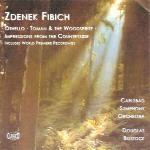Fibich’s music lives in the shadow of his contemporaries and countrymen, Smetana and Dvorák. Orchestrally speaking, he’s at his best in the three symphonies, where his attention to structural concerns and solid thematic workmanship make for satisfying listening. Unfortunately for him, Dvorák also wrote a symphonic poem on the subject of Othello, and he did it at the height of his powers. To make matters worse, Viteslav Novák also set the story of Toman and the Wood Nymph (here called “Woodsprite”) in a far juicier, more Romantically opulent musical language. Still, these are fine pieces and they’d make a decent impression in better performances. You can hear Toman, for example, far more imaginatively rendered by Vladimir Válek and the Prague Symphony Orchestra on Supraphon.
The suite Impressions from the Countryside, alas, just isn’t very interesting music. Fibich was not by any stretch of the imagination a “folk” influenced composer, and this has counted against him in his large abstract works, which is unfair. But in a piece such as this suite his lack of piquant melody, and especially his limited rhythmic vocabulary (compare the opening of Fireside Talk to the almost identical Village Dance and you’ll see exactly what I mean), add up to less than compelling listening. Nor, quite frankly, do Bostock and his undistinguished band offer much in the way of excitement or charm. This is workmanlike playing, never terrible, but resolutely lacking charisma. Othello, its opening brass fanfares rendered with a devastating lack of brilliance, offers a case in point. The slightly muffled recorded sound casts an additional pall over the proceedings. As a huge fan of Czech music in general it hurts to say it, but there’s little here to cheer about.
































